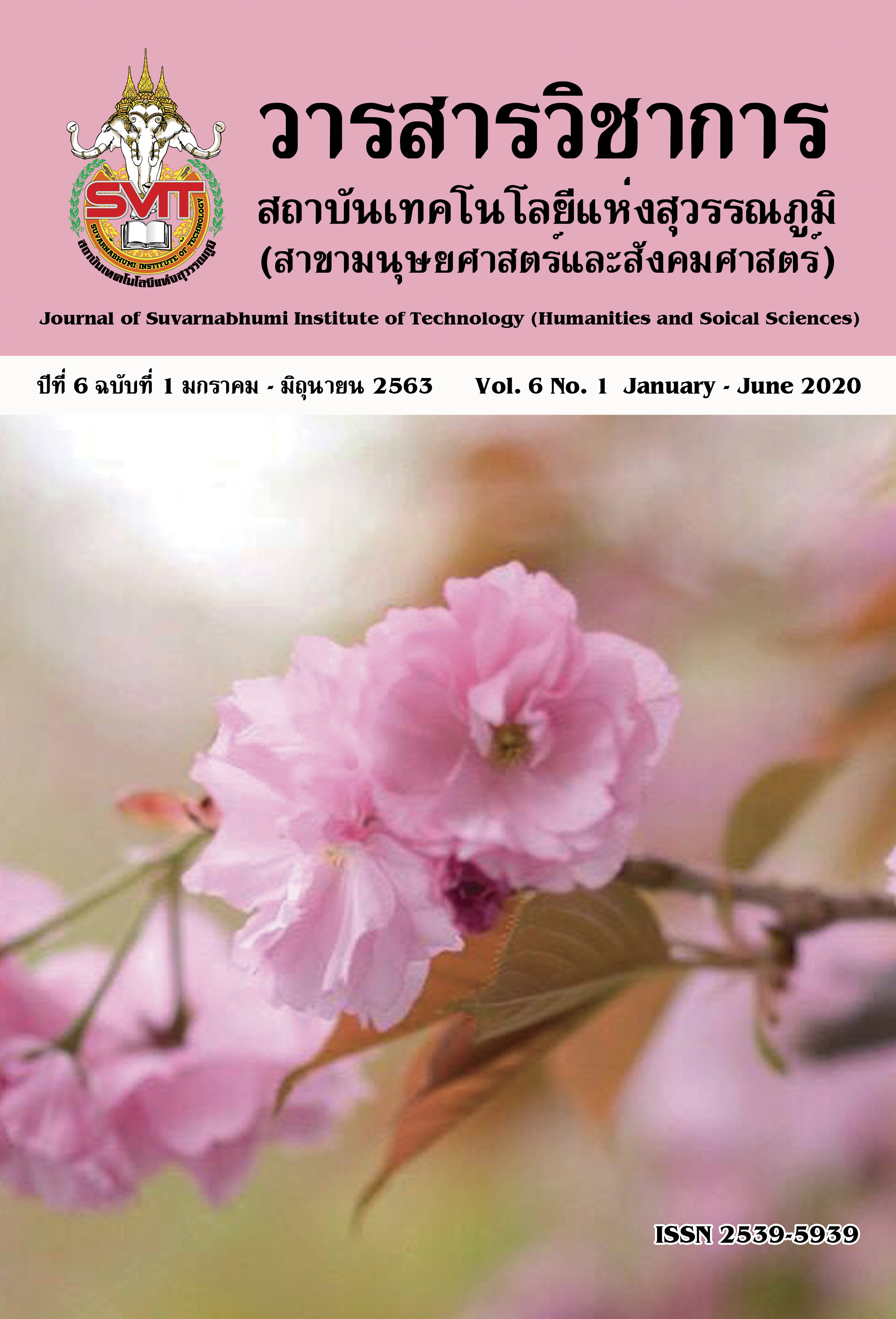THE NOBLE EIGHTFOLD IMPLEMENTATION IN NON-FORMAL AND INFORMAL EDUCATION AFFECTING STUDENT WELL-BEING
Keywords:
The Noble Eightfold Implementation, Non-formal and Informal Educational Management, Student Well-beingAbstract
This research aims to study nature and analysis of the relationship between research variables and to present the paths for developing the noble eightfold path using in Non-formal and informal educational management affecting to the well-being of the students. The questionnaire was developed from the results of the analysis and synthesis of literature both domestically and internationally and then drafted into 33 items of questionnaires, and then tested for structural validity, got KMO value along three conceptual frameworks on .82, .83 and .68 with a factor loading of .47 to .84.
While in the frame, confidence test results were Alpha, .89, .86, and .88, the Alpha value was .94 and had a Corrected Item between .31 and .76. In order that the data were collected from 349 samples for Statistics Program analysis, the research found that the characteristics of using the noble eightfold path for Non-formal and informal educational management including the well-being of the students were at a high level, both primary and secondary variables. The results of the relationship analysis revealed that both the primary variables and the component variables were positively correlated with the least to the most significant difference at the .01 level. While the major findings are found that the factors influencing to the use of the Noble eightfold path for Non-formal and informal educational management affecting the well-being of students include: Use to study, Value evaluation, Management, and management policies. In order that descriptive variance was 58% at the .05 level of significance. The hypothesis testing revealed that there was no statistically significant difference at .05 level, classified by work experience, educational level and Dhamma practice in the daily life. However, the using of research results in practice should be developed with a clear understanding of using the Noble eightfold path for educational management.
References
ชัยยศ เดชสุระ. (2558). การพัฒนาโปรแกรมโดยการน้อมนำหลักปรัชญาเศรษฐกิจพอเพียงและหลักพุทธธรรมไตรสิกขาเพื่อเสริมสร้างจิตสาธารณะนักศึกษาปริญญาบัณฑิต, วารสารวิจัยและพัฒนา วไลยอลงกรณ์ในพระบรมราชูปถัมภ์, 10(2), 217-231
ธรรณปพร หงษ์ทอง พระมหาวีรธิษณ์ วรินโท และพระมหาสุวัฒน์ สุวฑฒโน. (2559). พุทธวิถีแก้วิกฤติทางการศึกษา: พลิกฟื้นศรัทธาการศึกษาไทย, วารสารสันติศึกษาปริทรรศน์ มจร., 4 ฉบับพิเศษ, 52-63
ธิติ พึ่งเพียร. (2554). ความต้องการการศึกษานอกระบบ และการศึกษาตามอัธยาศัยของประชาชนในเทศบาลตำบลโพสะ อำเภอเมือง จังหวัดอ่างทอง, วิทยานิพนธ์ มหาวิทยาลัยศรีนครินทร์วิโรฒ
ประสพชัย พสุนนท์. (2558). ความเที่ยงตรงของแบบสอบถามสำหรับงานวิจัยทางสังคมศาสตร์, วารสารสังคมศาสตร์ มหาวิทยาลัยศรีนครินทรวิโรฒ, 18, 375-396
พระครูวินัยธรอำนาจ พลปญโญ พระมหาภัฎชวัชร์ เขมทสสี และพระวรเดช วรธมโม. (2560). พุทธจริยศาสตร์กับการพัฒนาการศึกษาเรื่องความจริง ความรู้ ความดี, วารสารสันติศึกษาปริทรรศน์ มจร., 5(1), 332-342
สมภาพ ไชยโย สมคิด พรมจุ้ย กาญจนา วัธนสุนทร และประเทือง ทินรัตน์. (2556). การพัฒนาระบบการประกันคุณภาพภายในสถานศึกษาขั้นพื้นฐานโดยการประยุกต์ใช้หลักอริยสัจ 4, วารสารศึกษาศาสตร์, 24(3), 48-61
สัมนาการณ์ บุญเรือง สุเทียน ละอองทอง และประเสริฐ ภู่เงิน. (2557). รูปแบบการจัดการความรู้ของศูนย์การศึกษานอกระบบและการศึกษาตามอัธยาศัย, วารสารการวัดผลการศึกษา มหาวิทยาลัยมหาสารคาม, 20(1), 218-231
สิริกวินทร์ ครุธครองพันธุ์. (2556). รูปแบบสาระองค์ประกอบของการบริหารจัดการของศูนย์การศึกษานอกระบบ และการศึกษาตามอัธยาศัยเขต ในกรุงเทพมหานคร, วารสารสุทธิปริทัศน์ มหาวิทยาลัยธุรกิจบัณฑิตย์, 27(81), 1-13
อัญชลี ธรรมะวิธีกุล. (2553). การศึกษานอกระบบและการศึกษาตามอัธยาศัยในปัจจุบัน, Phanchalee's Blog
Curado, J. (2017). How to combine formal, non-formal and informal learning in development coaches
Gill, S. (2009). Monitoring and Promoting well-being in education principles and possible approached to child well-being indicators, Brighton: Guerrand-Hermes Foundation for Peace accessed, 1, 12
Mohammad, M.M., Sulaiman, N.L., Sern, L.C., & Salleh, K.M. (2015). Measuring the validity and reliability of research instruments, Procedia-Social and Behavioral Sciences, 204, 164-171
Nota, L. (2017). Inclusion and wellbeing in school for all, Conference Abstract Book, Locarno, 13
Omerzel, D., & Sirca, N. (2007, January). The motivation of educational institutions for validation of non-formal learning, In International Congress for School Effectiveness and Improvement (ICSEI), Portoroz (pp.105-116)
Vartolomei, A.T. (2016). The relationship among formal, non-formal and informal education, Iulian Boldea Cornel Sigmirean
Downloads
Published
Issue
Section
License
Copyright (c) 2020 Suvarnabhumi Institute of Technology

This work is licensed under a Creative Commons Attribution-NonCommercial-NoDerivatives 4.0 International License.
The articles published are copyrighted by the Sarasas Journal of Humanities and Social Science. The opinions expressed in each article in this academic journal are those of the individual authors and do not reflect the views of Sarasas Suvarnabhumi Institute of Technology. The authors are solely responsible for all aspects of their respective articles. Any errors or inaccuracies in the articles are the sole responsibility of the authors.



